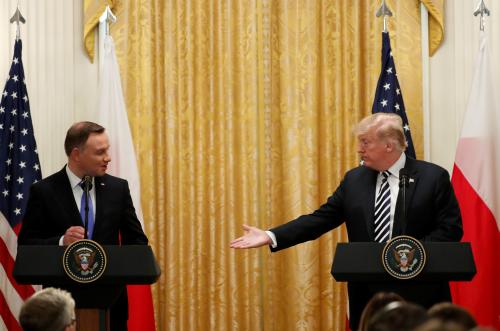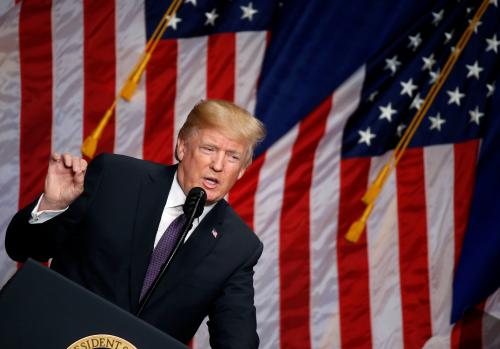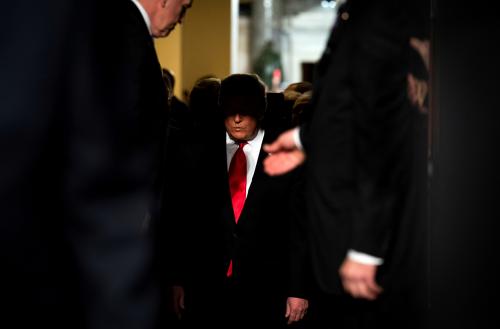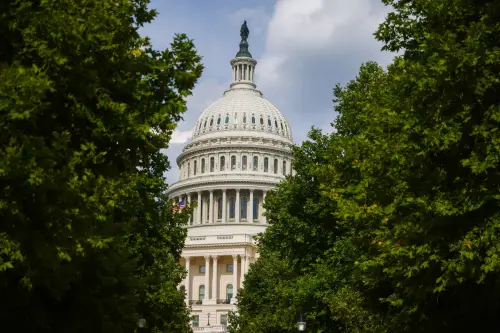The sidelining of the traditional Republican foreign policy tribes by the Trump administration has created an opening for a new movement that preaches social cohesion, national renewal, and restraint internationally, while celebrating toxic forces that undermine these aims, argues Constanze Stelzenmüller. This article originally appeared in the Financial Times.
A group of American thinkers, politicians and media personalities met in a dimly lit basement ballroom of the Ritz-Carlton hotel in Washington last week to reinvent conservatism. Or, as the conference logo specified, National Conservatism.
For a startup, the conference — organised by the new Edmund Burke Foundation — attracted an impressive number of guests and speakers. The roster featured big conservative names, including the billionaire investor Peter Thiel, Fox network host Tucker Carlson, and the Trump administration’s national security adviser, John Bolton.
With the 2020 presidential election already under way, a broad field of Democratic candidates, and an eviscerated Republican party, anyone interested in the future of American politics should pay close attention to this attempt at “reverse engineering an intellectual doctrine to match [Donald] Trump’s basic instincts” as Jacob Heilbrunn, editor of The National Interest, a conservative magazine, put it.
Although the US president had brought them together, some of the speakers were clearly steering wide of Trumpism. They seemed motivated less by chest-thumping nationalism than a desire to subject the titans of Silicon Valley to antitrust regulation, or concerns about the social ravages created by laissez-faire economic libertarianism.
Mr Thiel (founder of online payments company PayPal and the data-mining company Palantir) inveighed against Google and accused it of being penetrated by Chinese intelligence. JD Vance, author of Hillbilly Elegy, the best-selling 2016 memoir about growing up in the US Rust Belt, made a thoughtful appeal for a nation-state that can protect its citizens and provide them with public goods including health and education services.
This enthusiasm for an assertive state is the movement’s most distinctive departure from the small-government conservatism of the Reagan era — and something with which Europeans could find much to agree. The conference hosts, Israeli rightwing academic Yoram Hazony and American conservative activist David Brog, were likewise at pains to emphasise they had barred entry to white supremacists. But, on a national level, that door has been blown off the hinges by Mr Trump’s embrace of the politics of cultural grievance.
The reverberations of that breach were felt throughout the two-day event — whose attendees and speakers were overwhelmingly white. A law professor urged an immigration policy that gave preference to white over non-white immigrants. Josh Hawley, the junior senator from Missouri, was called out by the Anti-Defamation League for a speech in which he used hoary anti-Semitic dogwhistles such as “cosmopolitan elites”.
As for foreign policy, the three tribes that, between them, ruled Republican foreign policy for so long — the free-market internationalists; the realist restrainers; and the universalist neoconservatives — have been mostly sidelined in the Trump era. That is an opening for younger conservatives.
The events that define their attitude to America’s relations with the world are not the dissolution of the Soviet Union or halting genocide in the Balkans, but the “endless wars” in Iraq and Afghanistan and the global financial crisis that amount to a double humiliation of overreach and impotence. Hence the appeal of Mr Hazony’s depiction of the world as one of “competing tribes and nations”, and his warning of a coming “civil war” in America “if the fraying goes on.”
Yet the incoherence of nationalist foreign policy thinking was represented at the conference by two arch-enemies, both of whom were applauded: the hawk Mr Bolton who, according to Mr Trump, has never seen a war he doesn’t like, and the nativist Mr Carlson, who reportedly helped persuade Mr Trump not to bomb Iran.
The former shrewdly parried all attempts to enlist him in the culture wars, or to disavow Nato. The latter rehashed familiar rants against diversity and demographic change.
There were some more chilling notes. An appreciative audience listened to the academic Daniel Pipes enumerating Europe’s hard-right parties (“some call them Nazis or populists, I call them civilisationists”) and predicting their dominance in Europe. No one protested.
This is the ugly truth about the nationalists. They preach social cohesion, national renewal and restraint in international affairs. But they endorse and celebrate the toxic forces that destroy these aims. These are not the president’s critics, but his disciples.
The Brookings Institution is committed to quality, independence, and impact.
We are supported by a diverse array of funders. In line with our values and policies, each Brookings publication represents the sole views of its author(s).







Commentary
Op-edNational conservatism is coming for Washington
July 25, 2019